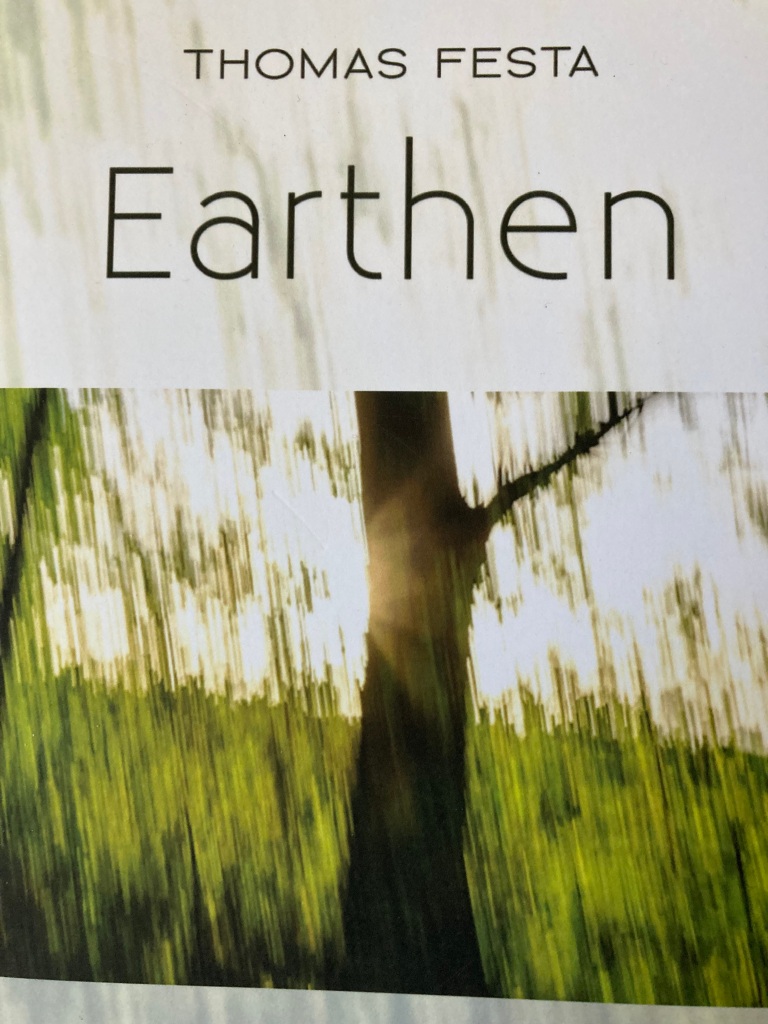
EARTHEN by Thomas Festa is published by Finishing Line Press (www.finishinglinepress.com) (2023). The cover art is by Dietmar Rabich and the cover design is by Elizabeth Maines McCleavy
Here is a chapbook that brings an engaging variety of form—from free verse through a sprinkling of prose poetry, haiku and renga—all of which keeps the reading of this collection very fresh.
Festa’s approach gives us the sense that we’re with the poet as he pulls from the day what’s worthy of his attention: from the world close at hand (“a barred owl’s wingbeat at midday”), through what it’s possible to divine in the flight of a peregrine (“the revelation of your lethal grace”). And how the latter poem invokes the divination of the ancient Greeks, followed on the next page by a poem that invokes ancient codices. In this you can follow Festa’s awareness and sensitivity to the mystical, the ineffable, but not as experiences that are removed from our lives, but rather as states of awareness that intersect with our lives. Poetry that, at times, expresses what’s both singularly personal and yet universal, as in “there are moments when/the whole world closes in on itself.”
Festa is also adept at conveying the darker emotions, as with the bereavement expressed in Andalusian June where “Evanescent minds are minarets of grief”. Or in the poem, On the Death of Miles Davis, where in eliciting the suffering of the musician, Festa goes on to say: “It is not/the tone of another world, but this one.” Thematically akin is the pathos that underlies The Motion Picture Hospital, a poem about an aged silent movie star, with a gut punch reveal in the final stanza.
The poet also considers the impermanence of what seems permanent, as expressed in the poem Field Trip, where the natural world’s “dense geologic/folds…dot the horizon like/opposed fates you could choose.” The irony in expressing to his son to hold onto that which cannot be held, as no moment in time can be held beyond the moment. A theme compactly presented as well in the poem Snowbound, Evening Light.
In another poem, Festa compresses his message to this essential wording: “spires to remind us/of what we’ll never be, reach…” There’s urgency—almost an insistence—in such phrasing; evident as well in this line from Rowing to Innisfallen: “Ripples from cardinal directions/galloped against the stern”.
“The forest remembers dead languages”, writes Festa. But it is the reader of this collection who will remember the poet’s forest.
////////
Read more poems and reviews by both Thomas Festa and Ken Holland here on Lightwood. Go to our Search Button and insert their names.
///////
Thomas Festa is Professor of English at SUNY New Paltz. He is the author of a study of John Milton, The End of Learning (2006), and two dozen scholarly articles, mainly on early modern English literature. Co-editor of four anthologies, including the award-winning feminist teaching text, Early Modern Women on the Fall (2012), he is currently at work on a study of the late W.S. Merwin’s poetry as well as his own original poems and translations which are widely published.
///////

Such a very insightful review of Tom’s wonderful book! Thank you, Ken!
LikeLike